Our newest CALI Award winner is Michelle Favero.
In 2010 Michelle was so moved by a screening of the African Gogo’s that almost immediately, along with some other women at the screening decided to form their own group and The Gogos and Mamas Group was born.
The Gogos and Mamas Group raises money to help Grandmothers (Gogos) in South Africa to care for their grandchildren who have been orphaned by AIDs and/or violence.
Q. Tell us about The Gogos and Mamas Group
Michelle: The Gogos and Mamas Group raises money to help grandmothers (gogos) in South Africa to care for their grandchildren who have been orphaned by AIDs and/or violence.
Comprising a network of Sydney women, mothers (mamas) and grandmothers (gogos), the group’s aim is to assist the community of Phola Park on the East Rand in South Africa through education and self-help programs.
The Gogos and Mamas Group does not provide financial support for the Gogos’ day to day living expenses, but rather focuses on providing them with tools to help create a better future for themselves and their families.
We are not medical practitioners, lawyers or political activists. We are women who have decided to help change the lives of others. Ghandi once said, “Be the change that you wish to see in the world.”
Our Group’s aims and objectives are not to eradicate AIDs/HIV – there are hundreds of medically funded organisations who focus on that vital research. We commit to increasing awareness about women who are overcoming insurmountable hurdles and help bring about change at a grassroots and very real level.
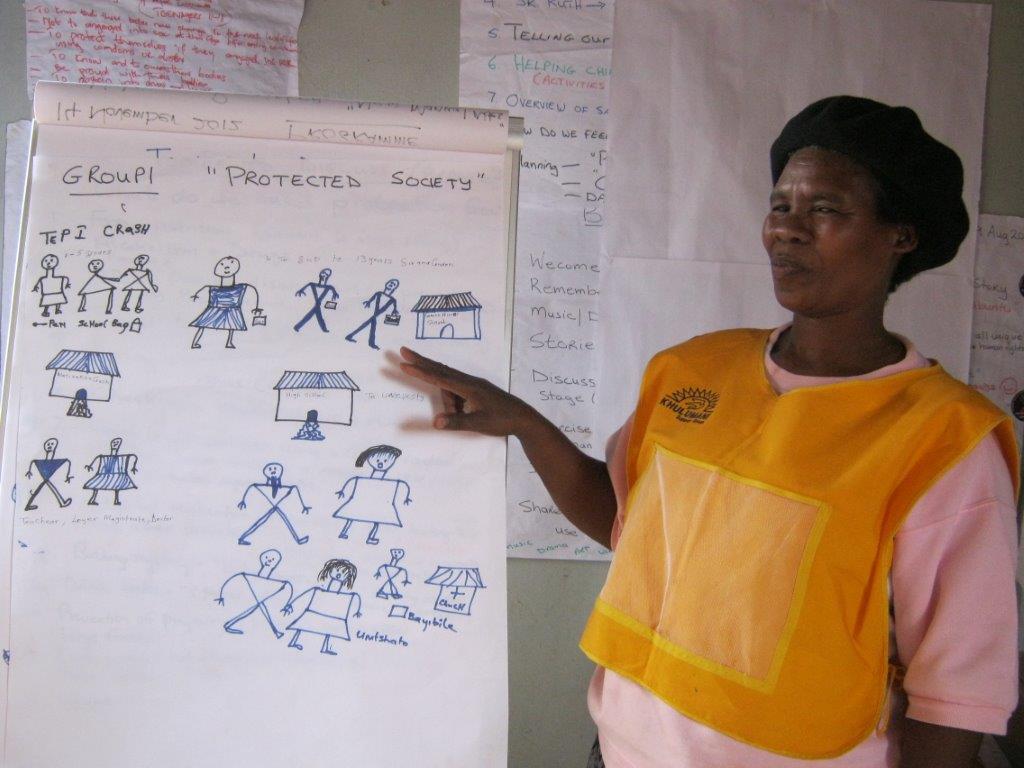
To date we have provided funding for a series of ‘Loving Relationships’ workshops which have focused on empowering the Gogos to become agents of change. The workshops were run by a leading South African community educator and focused on exploring the issues of sexuality, contraception, sexually transmitted diseases and respect for one’s body.
The group is now fundraising to purchase a machine for the Gogos that converts wood chips into sanitary towels. Thousands of teenage girls in South Africa stay at home for days each month when menstruating as they can’t afford sanitary protection.
By purchasing the machine, the group will be helping the Gogos to earn a living, making a difference to their own community and encouraging thousands of young girls back to school fulltime.
Q: What is the inspiration behind The Gogos and Mamas Group?
Michelle: In 2010, I was approached by a Canadian friend who had worked on a project with grandmothers in Wakefield, Canada. These women had developed a relationship with Gogos in Alexandra Township in South Africa who were looking after the AIDs-orphaned grandchildren.
The Wakefield Grannies, as they are known, had created a documentary about their African Gogos and I arranged for a public screening of this very moving account. Almost immediately a group of women at the screening and I decided to form our own group and The Gogos and Mamas Group was born.
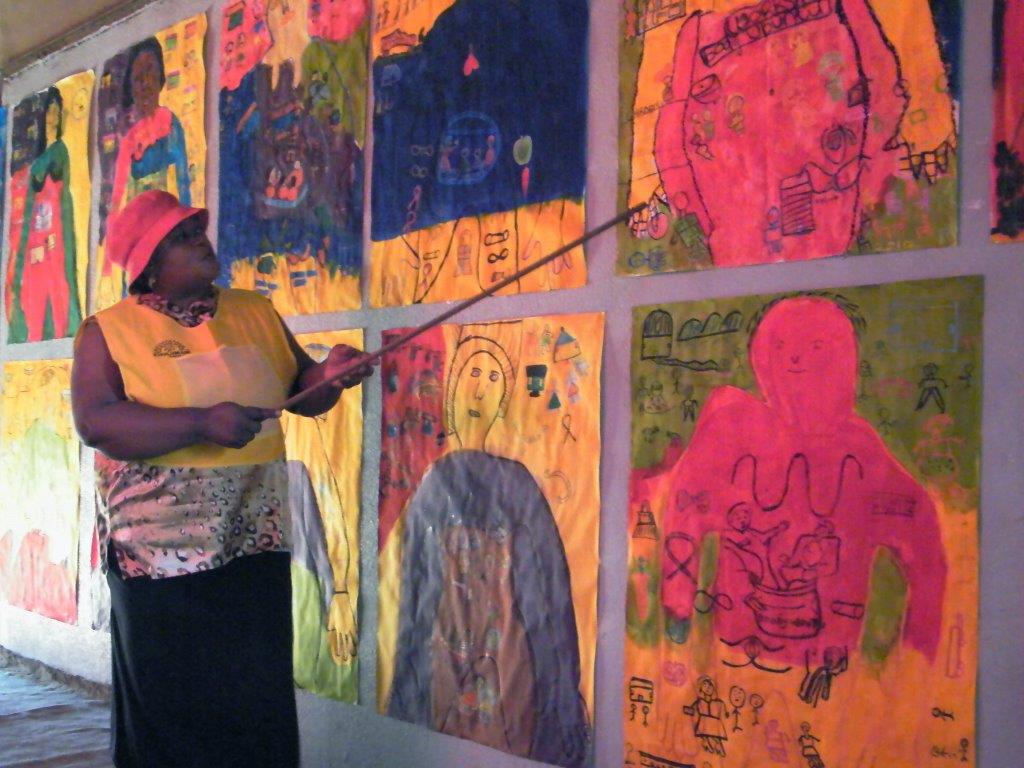
Q: What do you want people to know about AIDs in South Africa?
Michelle: In Australia, the incidence of HIV/AIDs is so low that the disease is not on the average Australian’s agenda. I was born in Zimbabwe and grew up in South Africa, witnessing the personal, social and economic devastation of HIV/AIDs. The statistics are horrifying and continue to climb every day.
However, as women, mothers and grandmothers, it is not the statistics that drive us, but the personal tales of triumph, of perseverance, love and hope that come from our support of the Gogos. For us, it is important for our supporters to see people, not statistics – to know that they are helping Gladys Siawela, Reinett Nkonkile and 85 year old Julia Magongoma.
HIV/AIDs is a preventable disease. Education is our most powerful tool to help reduce its incidence and rebuild communities and countries. We feel that we have a responsibility to increase awareness so that we can each make a difference to halting the spread of the epidemic. Changes have the tendency to snowball and it’s this effect that we are after.
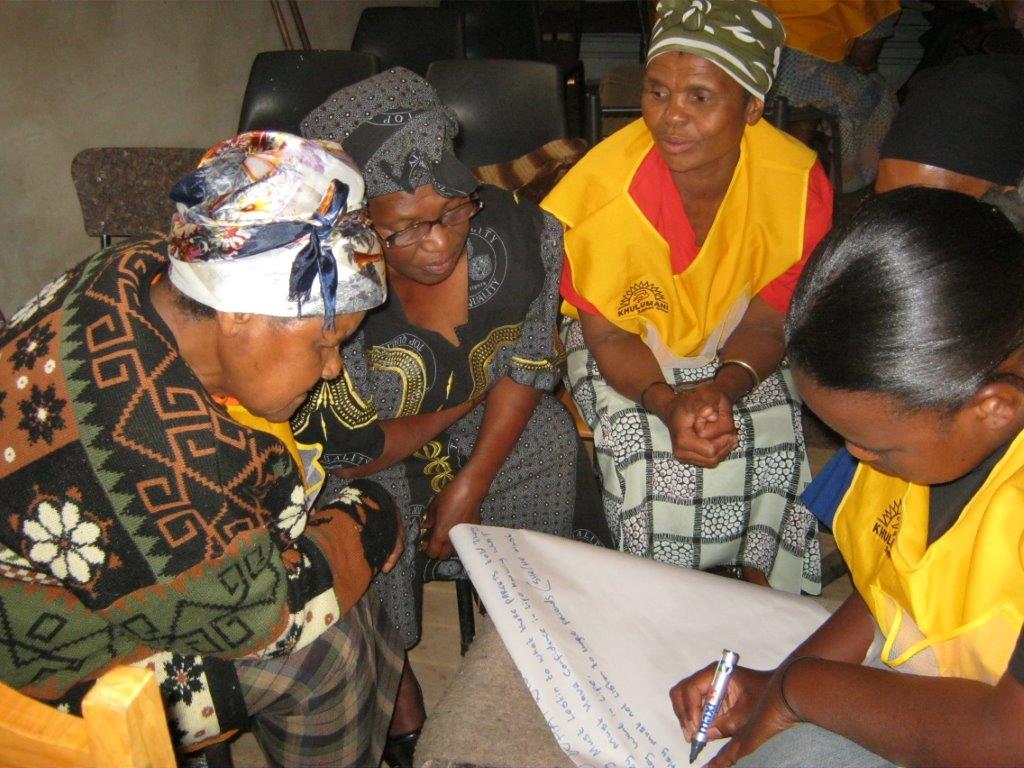
Q: What have you learnt from these grandmothers and orphaned children?
Michelle: I have learnt that you are never too old to learn, make changes and affect changes in others. To see an elderly women sitting next to her granddaughter, talking about contraception is a powerful image. I have also learnt that you can choose the way you react to any given situation.
Many of our Gogos have experienced tragedy and hardship that are beyond our frames of reference, yet they continue to believe that they have a responsibility to create change and make a new life for their families. This takes courage and strength that I find inspirational.
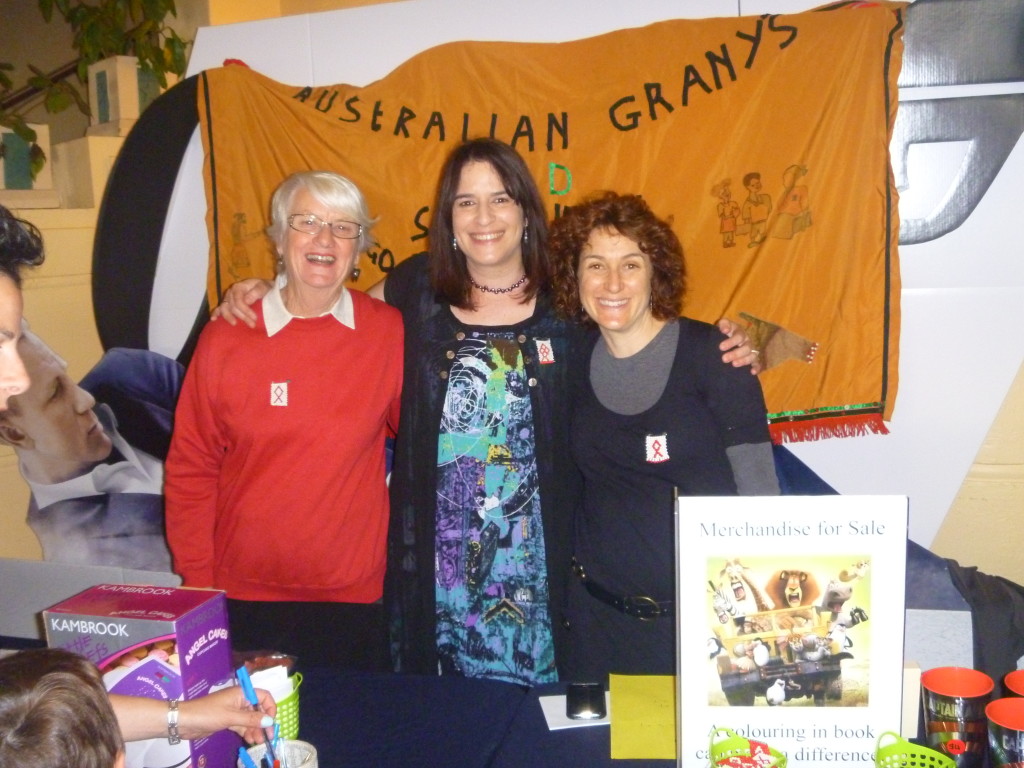
Q:What is something that you are really proud of?
Michelle: A series of ‘Loving Relationships’ workshops have taken place over the past two years. The workshops have given the Gogos the language and confidence they needed to speak to their grandchildren about sex, respecting their bodies and standing up for their right to say ‘no’.
I could go on for pages, but I feel that the success of the workshops is best expressed through the words of the Gogos.
“I gained a lot from the workshop. We now stand … strong and confident to speak to children about sexual issues. I managed to gain the confidence to tell my grandchildren where they came from. I accept that a person has a right to marry / love someone of the same gender. Before that in our tradition we would be called ‘witches’ and would not do that, even if that was what we felt inside.” Elizabeth Tyesi
“I also gained that I am the person who has to stand up and sit down with my children and go out with other women in our communities and look after their health. We learnt of protection…we need to speak about using male or female condoms. We must look at gender violence and look at what we can do about raising awareness on rape.”
“As a group, by doing this work we are putting our voice across all the world, not just South Africa. This workshop makes us feel strong to speak.” Gladys Siawela
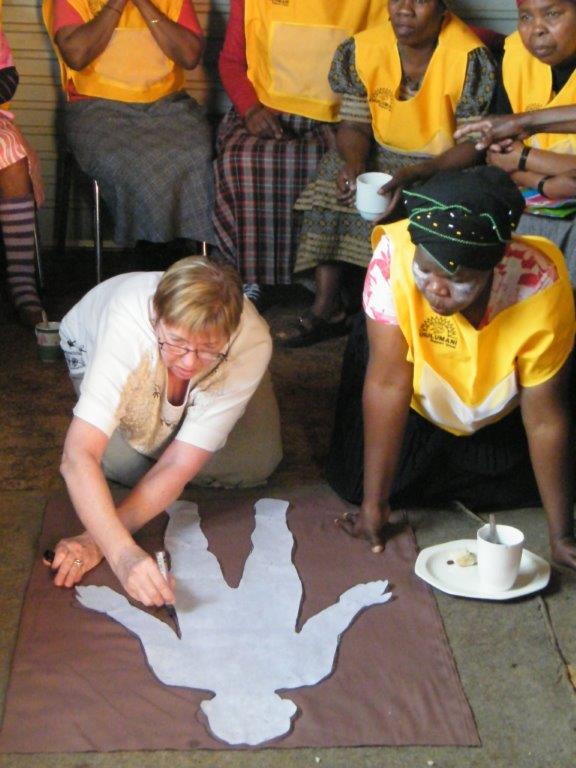
“My husband did not want us to use condoms, since this workshop, now we are using condoms. I am brave to tell my children about prevention to prevent disease and pregnancy. It was a healing process to be here.” Reinett Nkonkile
“At the age of 85 I gained more knowledge – I can teach my children and grandchildren about knowing, owning and protecting your body and can speak to them about condoms. If we can stand up in the world, smiling and proud, as the first ones to do that, it will be good.” Julia Magongoma
“…. we are facing problems and health issues like HIV / AIDS, rape and gender violence. The workshops equipped us to be the vehicle to take this information forward and follow up on treatment.” Danisile Mabanga
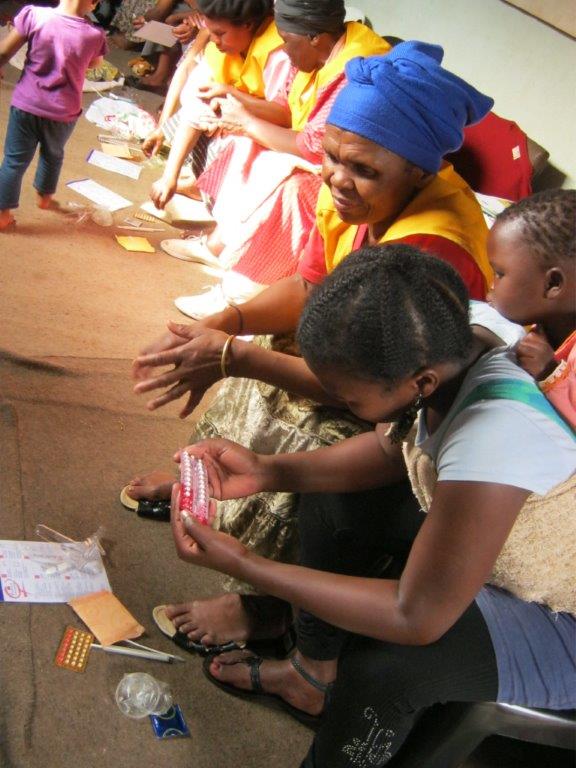
Q. Do you feel there is reward in your efforts?
Michelle: Being a part of the group is reward in itself. The group comprises women between the ages of 30 – 75 and gives us the opportunity to make deep personal connections based on shared goals.
When we receive reports and photos from the Gogos we are energised and know that our small offerings are making big differences to individual families. Being African myself, I do get a deep sense of satisfaction knowing that I have not abandoned those I have left behind.
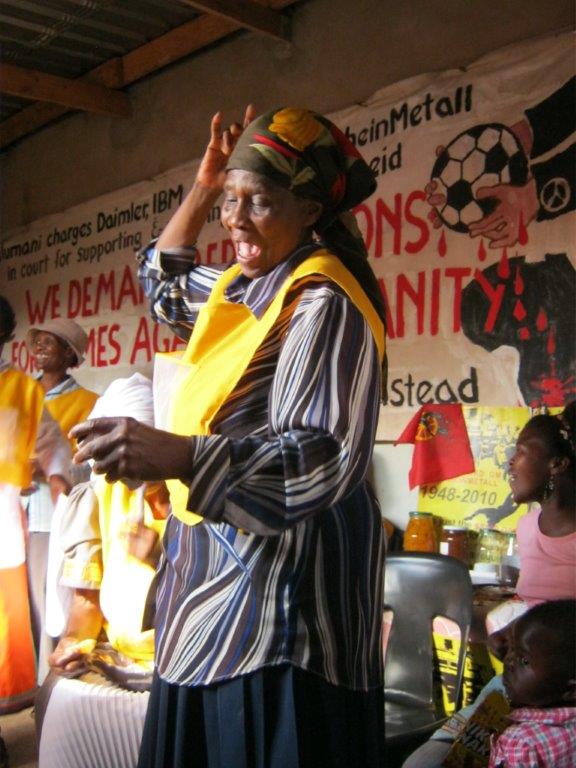
Q. If you had your way, everyone in the world would spend five minutes a day…
… reading. Education is the key to change.
.
Michelle Favero was born in Zimbabwe and moved to Johannesburg, South Africa with her parents in the 1970s. She graduated from the University of the Witwatersrand in 1991, majoring in Psychology and Sociology. Michelle’s early adult life was shaped by her relationship with Jewish Leader and Activist, Marlene Bethlehem, whose attitudes and outlook were major inspirations.
Following seven years in London in the 1990s, Michelle immigrated to Australia where she now lives with her husband Phil, son Dan and cat Luke. The Gogos and Mamas Group allows her to give hope back to the country which raised her.
Connect with Michelle through The Gogo and Mamas Group:
Want more inspiration?
- FEATURE VIDEO: Inspiring stories of womens rights
- CALI Award Winner: Rick and Kerry-ann Mapperson – Breakthrough Houses
- Volunteering overseas? How to plan your volunteer experience
- Frank Weijand – Winner of the CALI Award - January 1, 2019
- Camilo Buitrago Hernandez – Winner of the CALI Award - July 13, 2015
- Jay Jaboneta – Winner of the CALI Award - July 6, 2015